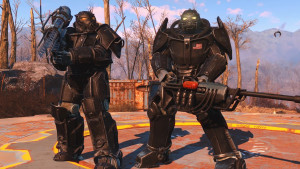Please support Game Informer. Print magazine subscriptions are less than $2 per issue
RPG Grind Time – The Evolving Definition Of An RPG

It’s the age-old question: What constitutes an RPG? This is something that’s been on my mind lately as the genre continues to grow and moves in different directions. If you ask anyone, their answer will differ depending on what they find important. For some, leveling and customizing your character are essential. For others, narrative and immersion – specifically how you control the will of your hero – are at the top of the list. This also extends to things like choice, whether it’s over the narrative or how you build your character. Wikipedia’s definition is vague almost as a way to encompass everything, stating “the player controls the actions of a character (and/or several party members) immersed in some well-defined world.”
I love the genre for all of the things above and more. I’ve watched RPGs grow for some time – thankfully, I had a cool grandpa who loved the genre and its D&D inspiration, and in turn, completed my fair share of NES and SNES RPGs with him. I remember just falling in love with the storytelling, the thrill of strategizing, and getting immersed in exploration. Dragon Quest certainly set a template for the turn-based formula, and Nihon Falcom’s action/RPGs (especially with the Ys series) only opened the doors wider. Shin Megami Tensei introduced monster recruitment, which would go on to be the backbone of the Pokémon craze. CRPGs like Fallout and Baldur’s Gate, while very traditional and isometric, provided a massive amount of choice in both gameplay and dialogue. Starting with Morrowind, The Elder Scrolls upped the ambition of rich settings and character customization in a 3D world. And this isn’t even touching on the evolution of MMORPGs, whose influence can be seen all over the genre.
There has never been one formula – one way to make an RPG. We’ve only seen this become more apparent in recent years. Remember the big step KOTOR took in streamlining RPGs? Mass Effect would only follow, toeing the line between shooter and RPG, with many decrying its shift away from traditional RPG elements. Final Fantasy, a series steeped in tradition, took a stab at a more open world and action combat with XV. Assassin’s Creed: Origins made a leap of faith into action/RPG territory, introducing leveling and quests. Horizon Zero Dawn combines a little of everything: leveling, quests, crafting, character development, and so forth.
Still, many can’t get away from Horizon's action-driven combat and stealth takedowns, often classifying it more in the action camp (Let the record show I disagree with that). Similarly, I’ve seen people say the Kingdom Hearts games aren’t RPGs, which I still can’t understand. Yes, there’s a focus on twitch skills, but you also are leveling up and assigning skills of your choice to Sora and friends. Furthermore, we have games merging sports mechanics with RPG progression and storytelling, as we saw just recently in Pyre and Golf Story. It’s not just the indies, either, as recent juggernaut sports games like NBA 2K and MLB: The Show, include modes that put stat building and narrative choice into the equation.
Change and growth is never a bad thing, and we’re seeing more developers take risks and not so neatly pack their games into one little box. This doesn’t mean the more traditional ways we’ve classified RPGs are going away. Persona 5, which sticks to its turn-based battle system and linear gameplay, earned plenty of acclaim and sales. Even the longest-running JRPG series, Dragon Quest, is on its eleventh entry. CRPGs, which have become more accessible over the years, still have a place for the hardcore with series like Pillars of Eternity and Divinity: Original Sin.
I’m almost certain we will continue to see developers experiment and blend genres. It makes sense. Why not take all the things we enjoy about games and pack them together? Isn’t the goal to make a game fun? This doesn’t mean genres will go away, either. Not only are they valuable from a marketing standpoint, but they’re beneficial in conveying to people what they’re getting. Sometimes it’s splitting hairs trying to decide if one game belongs in the “action,” “adventure,” or “RPG" camp. I’m glad we have flexibility in calling something an “action/RPG” or “strategy/RPG” or even “action/adventure,” but that still doesn’t stop people from arguing minutiae when it lands on one side over the other.
For me, an RPG has always been about the journey, the role you’re placed in, and having some agency over defining that character. I love watching my hero grow stronger and making choices that complement my playstyle – the power of leveling up at its finest. I’m glad this is a topic for discussion in today’s column because it reinforces that RPGs aren’t just stagnant. This allows us to reexamine how we classify them and why we choose to. We might not all agree on what makes a game fall into one genre versus another, but we can agree that the medium is still evolving. As more games continue to embrace mechanics of the genre, I'm confident that RPGs will continue to thrive. Oh, and that we’ll have plenty of pleasant surprises in the places they go.











